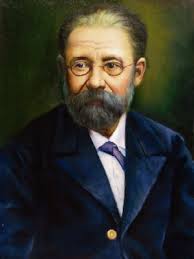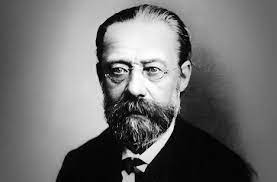Bedřich Smetana: A Complete Biography
Introduction
Bedřich Smetana (1824–1884) is widely regarded as the father of Czech national music. As a composer, conductor, and pianist, he played a central role in the development of a distinct Czech musical identity during the 19th century. His works blended romantic expressiveness with folk elements and patriotic themes, creating a sound that resonated deeply with the people of his homeland. Although he faced many personal and professional challenges—including political upheaval and complete deafness in his later years—Smetana’s legacy continues to influence Czech music and classical music worldwide.

Childhood
Bedřich Smetana was born on March 2, 1824, in Litomyšl, a town in Bohemia (then part of the Austrian Empire, now in the Czech Republic). He was the third of eighteen children, though many of his siblings died in infancy. His father, František Smetana, was a brewer for Count Waldstein and an amateur violinist, which helped foster the young Bedřich’s early interest in music (Grove Music Online).
Smetana showed remarkable musical talent from an early age, giving his first public piano performance at age six. Though his family was ethnically Czech, they spoke German at home—Smetana would not become fluent in Czech until adulthood. His early education was inconsistent due to frequent relocations, but his musical skills continued to develop rapidly.
Youth
In 1839, at the age of 15, Smetana moved to Prague to study. However, he struggled academically and financially, which led to an unstable period in his life. His father opposed a musical career, so Smetana initially worked as a music teacher. Eventually, in 1843, he studied under the respected music theorist Josef Proksch and began building a network of influential contacts, including Franz Liszt, who would later support his work (Encyclopaedia Britannica).
Smetana’s early compositions were inspired by the Romantic composers of the time, especially Liszt and Berlioz. In 1848, during the revolutionary fervor sweeping Europe, he established a music school in Prague and supported Czech nationalism, although he remained more comfortable speaking German than Czech.
Adulthood
Smetana’s adult life was marked by both artistic triumphs and personal tragedies. In 1849, he married Kateřina Kolářová, a pianist and childhood friend. The couple had four daughters, but three of them died young. Kateřina herself died of tuberculosis in 1859 during a trip to Sweden, where Smetana had moved in 1856 to become a conductor in Gothenburg (Oxford Music Online).
His years in Sweden were productive and helped solidify his reputation. However, he longed to return to his homeland. In 1861, he returned to Prague, where the Czech national revival was gaining momentum. Smetana immersed himself in the movement and committed himself fully to writing music with Czech themes and language. He married his second wife, Bettina Ferdinandová, in 1860.
Despite resistance from the conservative musical establishment in Prague, Smetana eventually gained prominence through his nationalist operas and symphonic works. He became the principal conductor of the Provisional Theater in 1866, succeeding Jan Nepomuk Maýr.
Major Compositions
Smetana’s most famous works are deeply connected to Czech national identity. His opera The Bartered Bride (1866) became a cornerstone of Czech opera, celebrated for its lively folk dances and humorous storyline.
Perhaps his greatest achievement is the symphonic cycle Má vlast (My Homeland, 1874–1879), a set of six tone poems that musically depict Czech landscapes, legends, and history. The most well-known piece from this cycle is Vltava (The Moldau), which portrays the journey of the Vltava River through the countryside with vivid musical imagery (New Grove Dictionary of Music and Musicians).
Other notable works include the operas Libuše (1872), written for the opening of the National Theatre in Prague, and Dalibor (1868), which was controversial at the time for its Wagnerian influences.
Smetana also composed chamber music, including two string quartets, and numerous piano pieces, such as Czech Dances and Album Leaves. These works combine technical sophistication with a deep emotional connection to Czech folk traditions.
Death
Smetana’s later years were plagued by illness and personal suffering. In the early 1870s, he began experiencing hearing problems, which worsened rapidly. By 1874, he was completely deaf, likely due to syphilis, a diagnosis confirmed posthumously.
Despite his deafness, Smetana continued to compose, completing several major works in silence, including the final pieces of Má vlast. His mental health deteriorated in the early 1880s, and in April 1884, he was institutionalized at an asylum in Prague. He died there on May 12, 1884, at the age of 60.
He was buried at Vyšehrad Cemetery in Prague, a resting place for many of the Czech Republic’s most important cultural figures.
Conclusion
Bedřich Smetana’s life was a blend of personal struggle and musical innovation. As the first composer to truly give voice to Czech national aspirations in music, he laid the foundation for successors like Antonín Dvořák and Leoš Janáček. His fusion of Romantic musical forms with Slavic folk elements and patriotic themes created a uniquely Czech sound that continues to inspire audiences and musicians alike.
Though silenced by deafness in his final years, Smetana’s music speaks louder than ever. His legacy endures not only in the concert hall but also in the cultural identity of the Czech people, where he remains a national hero.

Comments are closed